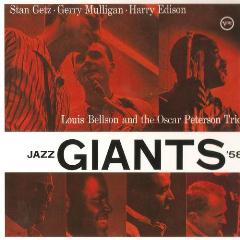Stan Getz, Gerry Mulligan, Harry “Sweets” Edison – Jazz Giants ’58 (1958)
Stan Getz, Gerry Mulligan, Harry “Sweets” Edison – Jazz Giants ’58 (1958)

1. “Chocolate Sundae” 2. “When Your Lover Has Gone” 3. “Candy” 4. “Ballade: “Lush Life”/”Lullaby of the Leaves”/”Makin’ Whoopee”/”It Never Entered My Mind” 5. “Woody ‘N’ You" Harry "Sweets" Edison – trumpet Stan Getz – tenor saxophone Gerry Mulligan – baritone saxophone Herb Ellis - guitar Oscar Peterson – piano Ray Brown – double bass Louie Bellson - drums
Producer Norman Granz (1918-2001) had an uncanny ability to create really amazing jazz albums by experimenting with the combinative chemistry of musical minds, temperaments, and personalities. While not every Granz session resulted in recordings of equal depth or profundity, the number of artistically rewarding, genre-defining albums that came together under his supervision is almost difficult for the human mind to fully comprehend. One fine example is Jazz Giants '58, a Verve album recorded inside the rented Capitol studios in Hollywood, California on August 1, 1957 and released almost exactly one year later. --- arwulf arwulf, Rovi
Although one could quarrel easily enough with the title, this meeting rises above the usual jam session produced by impresario Norman Granz for his Verve label because of the personnel. Gerry Mulligan, Sweets Edison, Oscar Peterson (practically the "house pianist" at Verve), Ray Brown—these are inimitable and personal instrumental voices in American music, and each speaks with sufficient authority to be considered "leader" on the date. But it's Stan Getz who makes the lasting impression.
Getz—a brilliant, "natural" player whose facility led Granz to match him against Dizzy Gillespie (Diz and Getz, Verve 1953) and, later, Gillespie and Sonny Stitt on a fast and furious session (For Musicians Only, Verve 1956) that must still hold the record for most beats per second on a conventional LP. Besides the technique, Getz' largely intuitive melodic-harmonic sensibilities (Focus, Verve 1961) placed him in the front ranks among all players. Yet on this occasion he offers up some of the most laconic, minimalist if not simple playing on record—not the effete, whispering and somewhat wimpy and meandering solos of his early "cool" period but music that's as deeply embedded in the blues as Billie Holiday and Lester Young performing "Fine and Mellow."
On the opening "Chocolate Sunday," an irresistible, medium-tempo blues in G, Getz follows Peterson's and Mulligan's animated solos by practically eschewing technique altogether in favor of pure emotional expression. It's an instance of the utmost restraint resulting in playing of unrestrained feeling, each sound articulated differently—from above the pitch or just under it—and the notes more often sustained than clustered into glib phrases. It's Getz channeling Prez, setting the tone of the session with a statement that's as basic and fundamental as the music can get, an honest cry from the heart—elemental yet penetrating lyric poetry.
The inclusion of Edison's spare and unobtrusive, Basie-indebted trumpet, though raising questions about the extravagant claim of the album's title, practically assures that the proceedings will flow and breathe unabated. On four of the five tracks the horn players even take a pass on the heads, making their initial entrances improvising on the chord changes in media res.
Lest listeners feel cheated where melody is concerned, Granz' customary ballad medley foregrounds it to the exclusion of embellishments by the players, with Mulligan's straightforward reading of "Lush Life" demonstrating perhaps the only way to do justice by Strayhorn's intricate mini-opus, and Getz' reflective and poignant reading of "It Never Entered My Mind" provoking comparison with Miles Davis' admired, deliberative recording of the Rodgers and Hart standard (Workin', Prestige 1956). With Gillespie's "Woodyn' You," the combination of Peterson finally airing it out, supported by Belson's breezy pulse and Ellis' propulsive "hand-drumming," sets up a tasteful Harmon-muted Edison solo followed by a rollicking turn by Mulligan capped by an extended, rich and varied Getz work-out that would bring a Jazz at the Philharmonic crowd to its feet were it not for the deceptive ease of the tenor giant's execution. ---Samuel Chell, allaboutjazz.com
download (mp3 @320 kbs):
salefiles yandex 4shared mega mediafire zalivalka cloudmailru uplea








